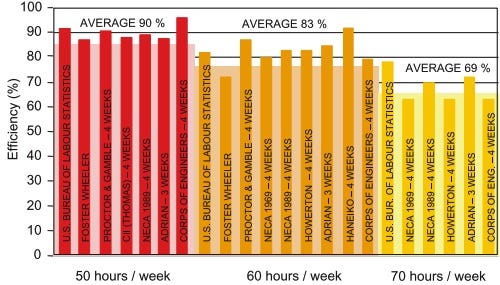Yesterday I puzzled over:
I have found many studies, conducted by businesses, universities, industry associations and the military, that support the basic notion that, for most people, eight hours a day, five days per week, is the best sustainable long-term balance point between output and exhaustion. Throughout the 30s, 40s, and 50s, these studies were apparently conducted by the hundreds. … Somehow, Silicon Valley didn’t get the memo. … Five-day weeks of eight-hour days maximize long-term output in every industry that has been studied over the past century. (more)
The most recent study this cites is from ’80 on construction. But I just dug a bit deeper, found some recent papers, and I can now say that this claim is just wrong, at least for construction.
First, an ’01 review found total product peaking at 60 hours per weak:

Now some claim that added product only comes in the first few weeks of long hours, after which exhaustion sets in. But an ’05 paper looked at 88 long construction projects, many over fifteen weeks duration, and it still found max product at 60 hr/wk. Also, an ’11 paper gives an integrated model that explicitly includes exhaustion effects, and it also has max product at 60 hr/wk.
So averaging over many construction projects, and including long-run exhaustion effects, total product tends to be highest at sixty hours of work per week. This leaves plenty of room for higher hours-per-week peaks 1) for especially hardy individuals, and 2) in less physically demanding industries.











Even if total product is maximised at 60, marginal product must be falling drastically way before that. What if marginal costs (for the company) are linear or near-linear?
Whilst some industries allow folks to work extra hours for no extra money, for many industries those extra hours will be overtime pay. A company will find itself paying the same amount for less and less useful work as the worker approaches 60 hours. As the company has a supply-curve to control, this will not be in its interests where overtime payments have to be made.
We might test this by comparing industries with standard overtime payments (e.g. blue collar) vs those without (some whitecollar/IT?).
Although I couldn't read 2 of the papers linked to here, one factor seems to be left out of the discussion so far - - transportation time. It seems assumed that employees simply 'show up' out of nowhere to work and dissapear to some undefined place afterwards where they simply recuperate from work and have nothing outside of work that occupies them. Perhaps that's a little extreme way of putting it but it is something that is important to that '40 hour' number.
In the past I've been OK with working 60-70+ hour weeks for extended periods with minimal loss of productivity but I have a ~7 minute commute and fairly little nonsense at home to deal with. Likewise I've lived in a small town where I worked 2 fulltime jobs and a couple part time jobs(at the same time) but I felt much better (and seemed to be more productive) than another job where I had an 2 hour commute, even at less than half the hours, and even though the other job was much simpler and less physically and mentally demanding. There's always other factors but this seems to be a big ommission.
I know people who commute for 4+ hours a day with families and responsibilities at home and still manage to work 45+ hour weeks...all else considered equal, the just sheer amount of work they are capable is going to be less than what I'm capable of merely because a lot of their 'good' hours are spent on the road, whereas mine are spent in front of a workstation.
Sure some of that will be evened out in large numbers of datapoints but the point is that if you're looking for a place to measure exhaustion point, the part to start measuring isn't the one that's available(ie the one where people start the clock) but the part where they leave what they are doing outside of work and start down the path of doing something else related to the interests of The Bureaucracy.
And then *that* line blurs very quickly into shiftwork and on-call 24/7ness where really, you're never not working on some level.